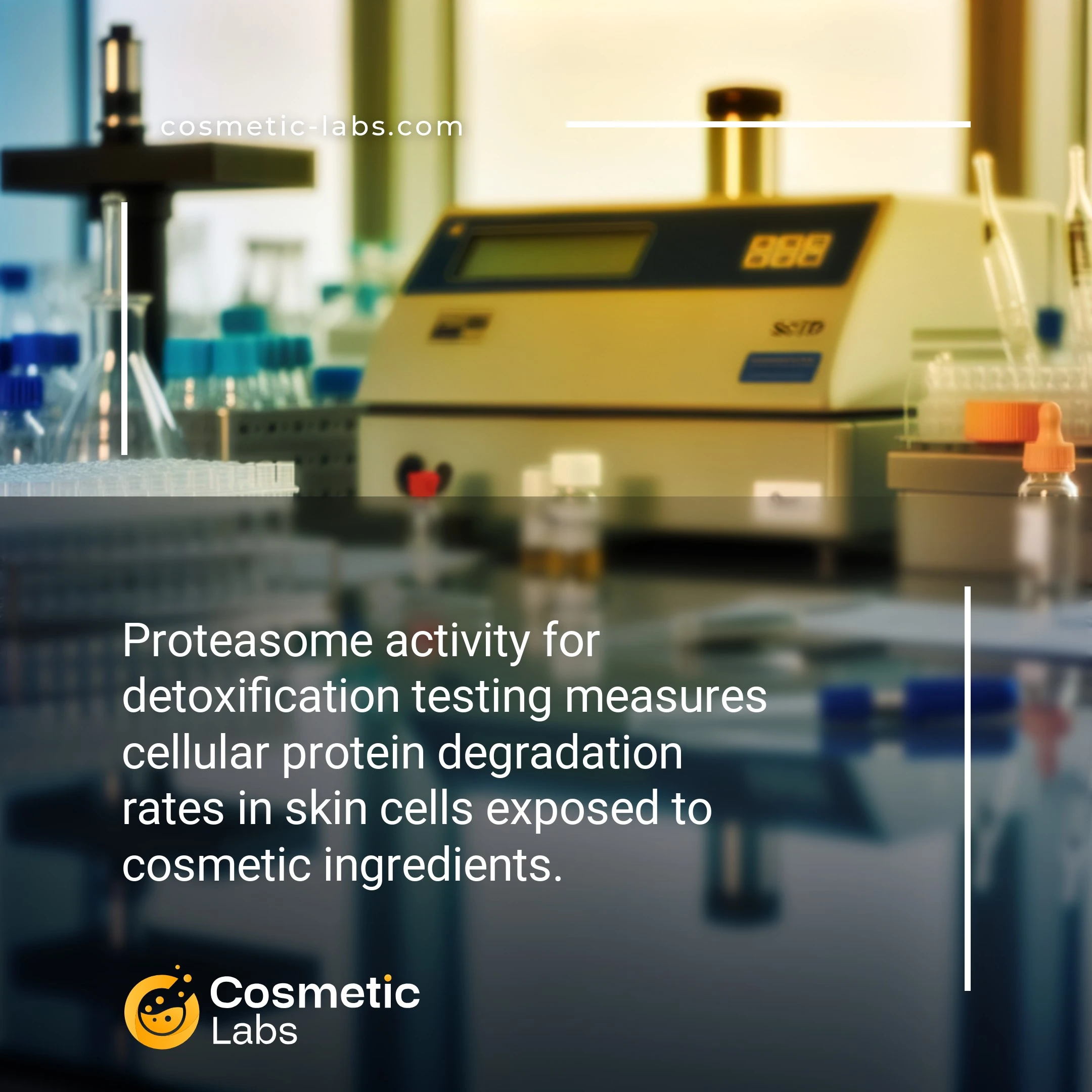Proteasome Activity Testing for Cosmetic Detox Claims

What is Proteasome activity?
Proteasome activity testing for detoxification measures how well cosmetic ingredients boost cellular protein degradation systems that break down damaged proteins caused by pollution and oxidative stress. Labs use fluorogenic substrates to track proteasome enzyme activity in keratinocytes after ingredient exposure, with increased chymotrypsin-like activity indicating enhanced cellular detox capacity. This testing helps brands validate anti-pollution claims by showing ingredients actually improve skin’s natural cleanup mechanisms at the molecular level.
Why do you need this service?
Beauty brands partner with cosmetic labs to validate anti-pollution skincare claims through proteasome activity assays that measure cellular detoxification responses. These tests demonstrate how active ingredients boost skin’s natural defense mechanisms against urban pollutants, UV damage, and oxidative stress, providing quantifiable data for marketing claims and regulatory submissions across global markets.
Who provides Proteasome activity services?
All cosmetic labs providing Proteasome activity services
There is no company providing these services at the moment.
Proteasome Activity Testing for Detoxification Validation
Proteasome activity assays measure your cosmetic ingredients’ ability to enhance cellular detoxification pathways, providing concrete data on how formulations protect skin from environmental pollutants and oxidative stress.
Cellular Detoxification Pathway Analysis
Labs run proteasome activity tests using cultured skin cells exposed to pollution mimics like PM2.5 particles or heavy metals. These assays measure how your active ingredients boost the cell’s natural cleanup system. The proteasome breaks down damaged proteins that accumulate from environmental exposure.
Testing protocols typically include:
- 20S proteasome activity measurement using fluorogenic substrates
- Protein carbonylation analysis to track oxidative damage
- Ubiquitin-proteasome system efficiency scoring
Results show percentage increases in detoxification capacity, helping you substantiate anti-pollution claims with measurable data.
Ingredient Efficacy Validation
Proteasome testing validates specific ingredients like peptides, plant extracts, or antioxidant complexes that claim to support skin’s natural detox processes. Labs expose skin models to controlled pollutant concentrations, then measure how your formulation enhances protein turnover and cellular repair.
Key metrics include:
- Proteasome enzyme activity levels (measured in relative fluorescence units)
- Protein aggregation reduction percentages
- Recovery time from oxidative stress exposure
This data supports marketing claims about pollution protection and helps optimize ingredient concentrations for maximum detoxification benefits. Connect with specialized labs on our platform to design custom proteasome assays for your specific formulation needs.
Practical Applications of Proteasome Activity Testing for Cosmetic Detoxification
Proteasome activity testing applications provide cosmetic brands with measurable data on how ingredients protect skin cells from environmental damage and support natural detoxification processes.
Anti-Pollution Skincare Development
Beauty brands use proteasome activity assays to validate claims about urban defense formulations and pollution protection products. Labs measure how botanical extracts, antioxidants, and peptides enhance cellular protein degradation pathways when exposed to particulate matter, ozone, and heavy metals.
Testing protocols evaluate ingredient efficacy at concentrations from 0.1% to 5%, with results showing proteasome activity increases of 15-40% compared to untreated controls. Brands apply this data to support marketing claims about detoxifying serums, protective moisturizers, and barrier repair treatments.
| Ingredient Category | Typical Concentration | Proteasome Activity Increase | Application |
|---|---|---|---|
| Plant Extracts | 1-3% | 20-35% | Anti-pollution serums |
| Synthetic Peptides | 0.5-2% | 25-40% | Repair creams |
| Antioxidant Blends | 2-5% | 15-30% | Protective moisturizers |
Regulatory Documentation and Claims Support
Cosmetic companies leverage proteasome testing data to meet regulatory requirements for functional cosmetics and substantiate detoxification claims. Labs generate reports showing cellular protection mechanisms that support product registration in markets requiring efficacy documentation.
The testing process takes 5-7 days and produces quantitative results measuring protein turnover rates, oxidative stress markers, and cellular recovery metrics. Brands use these reports for regulatory submissions, patent applications, and scientific marketing materials targeting dermatologists and skincare professionals.
Ready to validate your detoxification claims with proteasome activity testing? Contact specialized cosmetic labs on our platform to discuss your specific formulation needs and testing requirements.
